|
|
|
Sort Order |
|
|
|
Items / Page
|
|
|
|
|
|
|
| Srl | Item |
| 1 |
ID:
119924
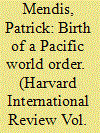

|
|
|
|
|
| Publication |
2012.
|
| Summary/Abstract |
In his re-election night speech in November 2012, President Barack Obama said, "Democracy in a nation of 300 million can be noisy and messy and complicated. We have our own opinions. . . These arguments we have are a mark of our liberty, and we can never forget that as we speak, people in distant nations are risking their lives right now just for a chance to argue about the issues that matter-the chance to cast their ballots like we did today." Soon after the US election, one such distant nation experienced a very different transfer of political power, as current Chinese President Xi Jinping replaced former President Hu Jintao in an orderly, stable, and Confucian manner.
|
|
|
|
|
|
|
|
|
|
|
|
|
|
|
|
| 2 |
ID:
119925
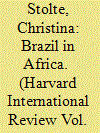

|
|
|
|
|
| Publication |
2012.
|
| Summary/Abstract |
In the shadow of China's and India's inroads into the African continent, South America's emerging power, Brazil, has been increasing its presence in Africa. However, its role in Africa has remained relatively unnoticed by international media and academia thus far. Brazil's low visibility in Africa cannot be explained exclusively by the fact that its financial engagement is still limited in comparison to that of China or India. An explanation would also need to include the unique way the South American power has interacted with Africa. Brazil has presented itself as a partner for Africa's development challenges rather than as a business partner. Although Brazil primarily imports oil and other natural resources from Africa, Brazil's cooperation with African countries, in contrast to that of China or India, has not been tied to contracts for oil-drilling or mining concessions. In fact, Brazil's expanding engagement in Africa serves other motives than resource-seeking. Brazil is trying to gain status as a global player by acting as a provider of development assistance and demonstrating global leadership on pressing international issues such as poverty alleviation, the fight against AIDS, or the provision of energy security.
|
|
|
|
|
|
|
|
|
|
|
|
|
|
|
|
| 3 |
ID:
119934


|
|
|
| 4 |
ID:
119913
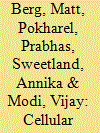

|
|
|
| 5 |
ID:
119935
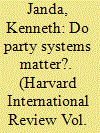

|
|
|
| 6 |
ID:
119926
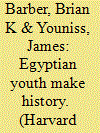

|
|
|
|
|
| Publication |
2012.
|
| Summary/Abstract |
Thirty years of research have identified common facets of social movements (i.e. grievances, resources, ideology, and opportunity) that challenge and change government systems. An example was the 1989 demise of the Soviet socialist bloc in Eastern Europe, which is described in Oberschall's 2000 article "Social Movements and the Transition to Democracy" and in Opp & Gern's 1993 study, "Dissident Groups, Personal Networks, and Spontaneous Cooperation: The East German Revolution of 1989." Once again we are witnessing a region-wide upheaval, this time in the Middle East as the Arab uprisings that began in Tunisia continue to ripple across national boundaries. It is too early to say with certainty how or why this cascade started, much less tell where it is headed. However, some basic facts make the situation worth inspecting carefully, especially since youth have been on the forefront of numerous movements throughout history. This has surely been the case in the contemporary Middle East.
|
|
|
|
|
|
|
|
|
|
|
|
|
|
|
|
| 7 |
ID:
119910
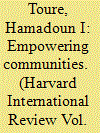

|
|
|
|
|
| Publication |
2012.
|
| Summary/Abstract |
The role of Information and Communication Technologies (ICTs), particularly broadband, in boosting economic growth and national competitiveness is now widely recognized. The ICT infrastructure is today both a vital national asset and an investment in a nation's future competitiveness in the growing global digital economy.
|
|
|
|
|
|
|
|
|
|
|
|
|
|
|
|
| 8 |
ID:
119928
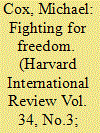

|
|
|
| 9 |
ID:
119931


|
|
|
| 10 |
ID:
119912


|
|
|
|
|
| Publication |
2012.
|
| Summary/Abstract |
In a recent article in Time, former United States president Bill Clinton lists five global phenomena as cause for optimism, beginning with the assertion that "phones mean freedom." Clinton explains that mobile phones "foster equality" and have "revolutionized the average person's access to financial opportunity," citing a 2010 UN study that found that mobile phones are "one of the most effective advancements in history to lift people out of poverty." To expand on Clinton's important observations, it is notable that the device that "fosters equality" and "lift[s] people out of poverty" is by and large provided by entrepreneurs and businesses seeking to make a profit.
|
|
|
|
|
|
|
|
|
|
|
|
|
|
|
|
| 11 |
ID:
119922
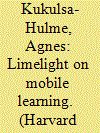

|
|
|
|
|
| Publication |
2012.
|
| Summary/Abstract |
Mobile apps and tablets have assumed a prominent position in the landscape of technology use in education and training, as anticipated by the EDUCAUSE 2012 Horizon Report. With mobile phone subscriptions totaling around six billion, and predictions that sales of tablets and e-book readers will increase substantially as prices continue to fall, mobile devices are rightly seen as a compelling means of solving pressing global problems in education. Numerous successes have already been recorded.
|
|
|
|
|
|
|
|
|
|
|
|
|
|
|
|
| 12 |
ID:
119927
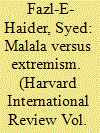

|
|
|
|
|
| Publication |
2012.
|
| Summary/Abstract |
In October 2012, Malala Yousafzai was shot by the Taliban in Pakistan's northwestern town of Swat when she was returning home from school in a van. Why did the Taliban perceive a schoolgirl as a grave threat to its agenda of radicalizing youth? Armed with pen, enlightened with knowledge, and charged with the passion of fighting for the right to girls' education, 14-year-old Malala has had no less of an impact than a drone in combating Talibanization.
|
|
|
|
|
|
|
|
|
|
|
|
|
|
|
|
| 13 |
ID:
119908
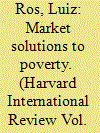

|
|
|
|
|
| Publication |
2012.
|
| Summary/Abstract |
A generation ago, Latin America and the Caribbean (LAC) was known for debt crises, military dictatorships, hyperinflation, and grinding poverty. Today, the region is characterized by regional political and economic integration, increased global market share for its exports, sound financial management, and declining unemployment. Most importantly, it is a region that has internalized its role in the world. Imbued with new choices and an independent voice, the region is emerging as the center of the South-South-East exchange of goods and financial capital between LAC, Africa, and China. It is time for the world to look at Latin America and the Caribbean in a new way.
|
|
|
|
|
|
|
|
|
|
|
|
|
|
|
|
| 14 |
ID:
119929
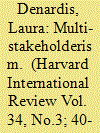

|
|
|
| 15 |
ID:
119909


|
|
|
|
|
| Publication |
2012.
|
| Summary/Abstract |
Famed seventeenth-century jurist Hugo Grotius warned that in warfare belligerents must "not believe that either nothing is allowable, or that everything is." The latter belief holds that any and all tactics are allowed in warfare, while the former, a largely Christian theological view, holds that warfare is immoral and any resultant actions are therefore prohibited. Grotius understood that unilateral adherence to either of these notions would lead directly to an unworkable paradigm. Rejecting each belief's most extreme position while simultaneously adopting their reconcilable characteristics, Grotius began to develop a feasible legal framework for conducting warfare. Ultimately, as Oxford University's Karma Nabulsi describes in her outstanding work Traditions of Justice and War, by seeking the "middle ground" between these two seemingly incompatible views Grotius successfully shaped a conciliatory, realistic model for regulating warfare. The resultant middle ground, which recognized the necessity and legality of "just" wars while proscribing certain aspects of military conduct, solidified Grotius's legacy and, more importantly, set the stage for the profound legal developments-particularly in the 20th century-that would circumscribe subsequent conflicts, including those in which the United States finds itself today.
|
|
|
|
|
|
|
|
|
|
|
|
|
|
|
|
| 16 |
ID:
119911
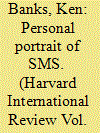

|
|
|
|
|
| Publication |
2012.
|
| Summary/Abstract |
I am currently entering my 11th year in the once fledgling field of "mobiles for development." The story of "m4d," as it is fondly known, and the countless stories of how mobiles have impacted the lives of hundreds of millions of people throughout the developing world, are ones that are closely tied to my own.
I would like to share some of those stories with you, along with a few highlights from my own journey-lessons learned, the impact of mobile phones on the lives of ordinary (and not so ordinary) Africans, the background to my own FrontlineSMS project, and how mobile technology fosters "democratized development" across the world. But let us start at the beginning.
|
|
|
|
|
|
|
|
|
|
|
|
|
|
|
|
| 17 |
ID:
119932
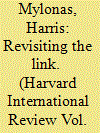

|
|
|
| 18 |
ID:
119923


|
|
|
|
|
| Publication |
2012.
|
| Summary/Abstract |
It is no longer a secret-Africa is finally on the rise. For many decades, we have been used to associating the continent with the Six D's of horror: decay, disaster, drought, disease, despotism, and despair. They have not disappeared over night, but they are now being complemented by the Three E's: emergence, evolution, and emancipation.
|
|
|
|
|
|
|
|
|
|
|
|
|
|
|
|
|
|
|
|
|